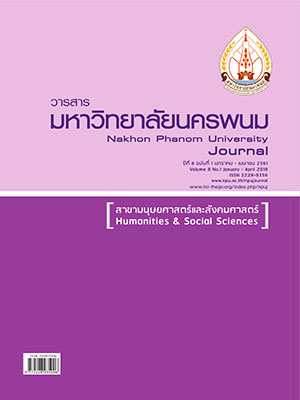พุทธนวัตกรรมการพัฒนาระเบียบวินัยของเยาวชนไทย
Main Article Content
Abstract
According to the investigation to analyze Buddhism innovations that affect the development of discipline of Thai youth, it was found that the situation of Thai youth had a negative effect on the development of the country. This is because the Thai youth of today do not pay much attention to the issue of discipline. At the same time, Buddhism has an important innovation in development of youth’s discipline by focusing on teachings about the five precepts or morals about all vices, trades that should be avoided by laymen, biases that should be abstained. The Buddhism innovation for developing the youth’s discipline can be divided into 5 steps. Step 1 – laying the relationship system between the family institutions and the Buddhism institution, especially by following the traditional practice defined in the community. Step 2 – preparing the foundation for discipline knowledge, which is the duty of families to encourage the Buddhism institution to practice the training of purifying the youth with knowledge of what should be done or not done or what is good or not good. Step 3 – strengthening the social role of monks in preventing disciplinary offence by warnings, giving directions, and guiding the effects of offence. Step 4 – cultivating discipline for Thai youth by mainly starting from the small points in the family until it becomes a habit in the future. Step 5 – maintaining discipline in Thai youth through the increase of designing Buddhism activities based on Buddhism teachings, which requires all sectors to understand the contexts of the youth, both disciplined and undisciplined ones before any adjustment of their behaviors in a better way is made. Therefore, the development of the youth’s discipline may be customary in the community through the system of relationship between the families and the Buddhism institution, such as the age limit for the ordination of novices, etc. In addition, the potential of novice parents to care for the youth for following the good discipline needs to be developed in order that the youth will be able to adjust their lives to conform to the doctrines of Buddhism.
Article Details
References
กลุ่มพัฒนาคุณภาพและมาตรฐานการศึกษา สำนักงานการศึกษาเอกชนจังหวัดสงขลา สำนักงานคณะกรรมการส่งเสริมการศึกษาเอกชน กระทรวงศึกษาธิการ. (2558). แนวทางการจัดกิจกรรมส่งเสริม ค่านิยมหลักของคนไทย 12 ประการ สู่การปฏิบัติในสถานศึกษาเอกชน สังกัดสำนักงานการศึกษาเอกชนจังหวัดสงขลา. สำนักงานการศึกษาเอกชนจังหวัดสงขลา.
เจตน์ ตันติวณิชชานนท์. (2559). การศึกษาวิเคราะห์การปลูกฝังจริยธรรมในเยาวชนตามทัศนะของพระพรหมคุณาภรณ์ (ป.อ. ปยุตฺโต). บัณฑิตวิทยาลัย มหาวิทยาลัยมหิดล.
นพวัลภ์ คงคาลิหมีนและคณะ. (2559). การศึกษาพฤติกรรมการกระทำความผิด กรณีศึกษาเด็กและเยาวชนที่มารายงานตัวต่อศาลเยาวชนและครอบครัว จังหวัดสงขลา. การประชุมหาดใหญ่วิชาการระดับชาติและนานาชาติครั้งที่ 7. มหาวิทยาลัยหาดใหญ่.
ปิยธิดา ศรีจินดา. (2556). ปัจจัยที่มีความสัมพันธ์กับการประพฤติผิดกฎระเบียบของนักเรียน ระดับมัธยมศึกษาตอนปลาย : ศึกษาเฉพาะกรณีโรงเรียนในเขตจอมทอง จังหวัดกรุงเทพมหานคร. วารสารวิทยบริการ. 24(4) : 1.
พระสรวิชญ์ อภิปญฺโญ. (2559). การสร้างและพัฒนารูปแบบการลดพฤติกรรมความรุนแรงของวัยรุ่นตามแนวทางพระพุทธศาสนา. วารสารรัชต์ภาคย์. 10(20) : 141.
มหาจุฬาลงกรณราชวิทยาลัย. (2539). พระไตรปิฎกภาษาไทย ฉบับมหาจุฬาลงกรณราชวิทยาลัย. กรุงเทพมหานคร : โรงพิมพ์มหาจุฬาลงกรณราชวิทยาลัย.
ราเชนทร์ นพณัฐวงศกร และคณะ. (2559). กระบวนการประชาสังคม“บวร”หลักในการพัฒนาชุมชนให้ยั่งยืน. การประชุมวิชาการระดับชาติสหวิทยาการเอเชียอาคเนย์ 2559 ครั้งที่ 3 The 3rd SAU National Interdisciplinary Conference 2016.
สินกร สินสม. (2558). ปัจจัยที่มีผลต่อความมีวินัยในตนเองของนักเรียน ระดับมัธยมศึกษาตอนต้น โรงเรียนมัธยมศึกษาจังหวัดนนทบุรี สังกัดสำนักงานเขตพื้นที่การศึกษามัธยมศึกษา เขต 3. ปริญญาศึกษาศาสตรมหาบัณฑิต. วิทยาครุศาสตร์ มหาวิทยาลัยธุรกิจบัณฑิตย์.
สำนักงานเขตพื้นที่การศึกษาประถมศึกษาหนองบัวลำภู. (2558). แนวทางการขับเคลื่อนค่านิยมหลัก 12 ประการ สู่การปฏิบัติ ในสถานศึกษา ปีการศึกษา 2558. หนองบัวลำภู. สำนักงานเขตพื้นที่การศึกษาประถมศึกษาหนองบัวลำภู เขต 1.


